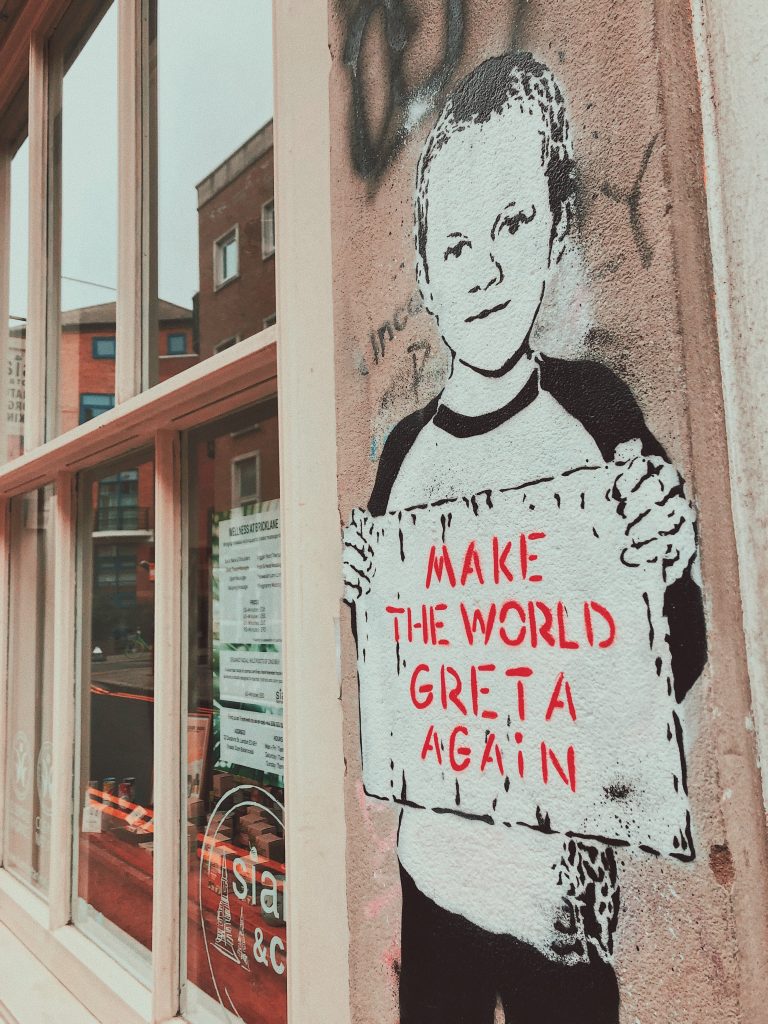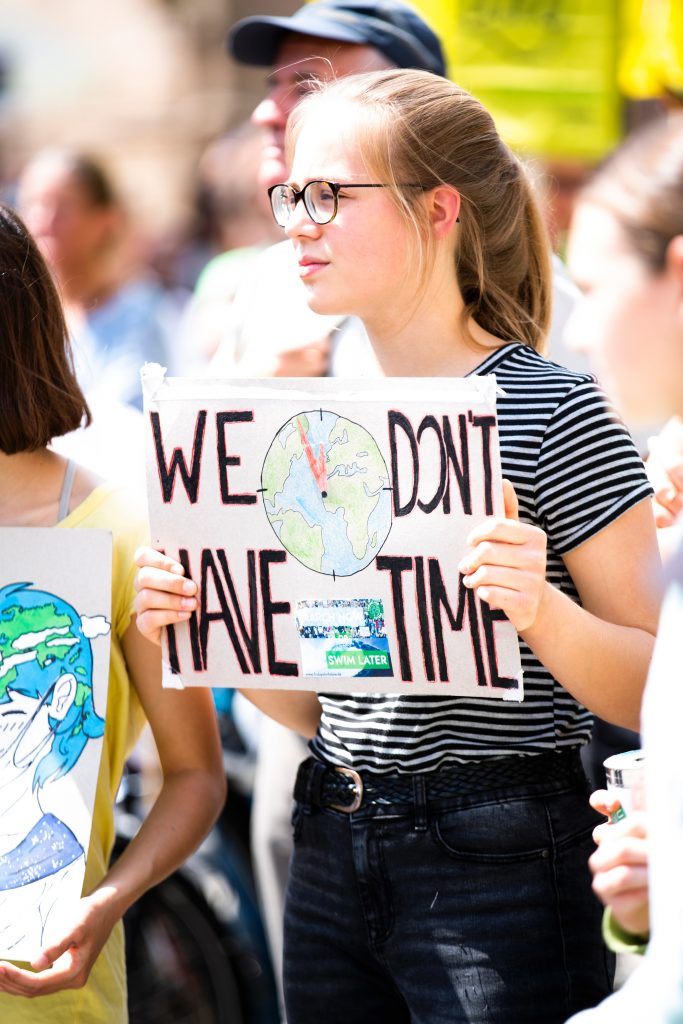THE CLIMATE CRISIS
Climate change is a hot topic of conversation at the moment. With the Earth’s temperatures rising, so are the youth in protest against climate inaction. The IPCC and scientists have been warning us of the consequences of anthropogenic climate change for decades (Acciona, 2020). It is already evident that higher levels of warming are causing more extreme weather events. These effects will impact everyone, but they will be most devastating to vulnerable demographics such as young people. It is their future that is on the line, which is why global youth-led organisations like Fridays For Future have started fighting for government action and climate change.
WHAT IS FRIDAYS FOR FUTURE?

Fridays For Future, or FFF, is a global youth-led climate strike movement started in 2018 by Greta Thunberg (FFF, 2020). A then 15-year-old student, as she sat outside the Swedish Parliament every day in the three weeks leading up to the Swedish election, demanding urgent action on the climate crisis (Benjamin Bowman, 2020). This simple gesture of determination shone a much-needed bright light on climate change. Since starting her strikes, Greta has been invited to talk at many prestigious conferences such as the UN’s COP24, the World Economic Forum in Davos, and other climate meetings in Stockholm, Brussels, Helsinki, and London (Acciona, 2020). Most importantly, her actions have inspired other young people to take action.
Soon after her first weeks striking in front of parliament, she was joined by other young people. After the election, they decided to continue their strike every Friday until the Swedish government provided a safe plan to stay below the 2°C temperature increase, in line with the 2015 Paris agreement (FFF, 2020). Her actions gained traction on social media and soon school children all around the world started staging their own climate strikes in their hometowns. From this a new global, youth-led movement grew, proving as she says that “No one is too small to make a difference.” Fridays For Future is an international awakening and is part of a hopeful new wave of change, inspiring millions to take action on the climate crisis (FFF, 2020).
FFF AIMS AND GOALS
Fridays For Future is an independent movement, free from commercial interests and political party agendas. The goal of FFF is to act as a call to action for policymakers (FFF, 2020). They aim to pressure governments with their moral duty to listen to science and take forceful action to limit global warming. In August 2019, FFF released an official Declaration of Lausanne, demanding three main targets be met by world leaders (FFF, 2020).
- Keep the global temperature rise below 1.5 °C compared to pre-industrial levels.
- Ensure climate justice and equity.
- Listen to the best-united science currently available.
WHY ARE THE YOUTH PROTESTING?

Younger generations have become collectively aware that they are some of the most vulnerable victims of climate change. What happens now will directly impact them in the future. But as they do not have the power to initiate systemic change, they are demanding with their voices and their actions that those in power do.
Frustrated by the lack of leadership, progress, and understanding of climate issues from politicians, the youth are no longer satisfied with responses of sympathy. Adult leaders are applauding youth activists for their inspiration and passion, yet they sit there and do nothing. “This is all wrong,” Greta said at the UN’s Climate Action Summit in 2019. “I shouldn’t be up here … yet you all come to us young people for hope. How dare you!” (Benjamin Bowman, 2020).
Young people are demanding action because they care about the Earth, for their future, and for one another. They sense that not enough is being done to preserve this beautiful planet and that we must unite behind the science and make those in power take the facts seriously, and act accordingly. They strike for their future and the future of other populations at risk of suffering because of climate change. Scientists have been warning governments of climate change for 50 years and haven’t been listened to, which is why FFF takes to the streets in non-violent protests (FFF, 2020).
STANDING TOGETHER
Civil disobedience has proved to be an effective tool for the public to achieve long-term change. As well as driving a movement for climate change solutions, collective action helps individuals cope with their anxiety. A specific type of anxiety termed eco-anxiety has been given to the fear of environmental damage or ecological disaster. This feeling is largely based on the current and predicted future state of the environment and human-induced climate change (Jennifer Huizen, 2019). Striking together can improve the mental well-being of young people, bring hope, and lead to direct action.
Even in the midst of a pandemic and other sociopolitical and economic crises, climate change will not simply press pause. It is still a pressing issue that demands immediate, concrete, and ambitious action from world leaders. The next Global Climate Strike will be held on March 19th, 2021. Responding to the COVID-19 pandemic, however, the event will take on different forms in different places. A new call for #NoMoreEmptyPromises is uniting people beyond borders under the same goal of immediate climate action (FFF, 2020). THRIVE recommends checking out Fridays For Future to find out how you can get involved in the fight for climate justice and long term sustainability.
REFERENCES
Fridays For Future [FFF] (2020). About us. Retrieved from https://fridaysforfuture.org/
Acciona (2020). Fridays For Future: Time’s against the planet. Retrieved from https://www.activesustainability.com/climate-change/fridays-for-future-time-against-planet/
Benjamin Bowman (2020). Fridays for Future: how the young climate movement has grown since Greta Thunberg’s lone protest. Retrieved from https://theconversation.com/fridays-for-future-how-the-young-climate-movement-has-grown-since-greta-thunbergs-lone-protest-144781
Jennifer Huizen (2019). What to know about eco-anxiety. Retrieved from https://www.medicalnewstoday.com/articles/327354























